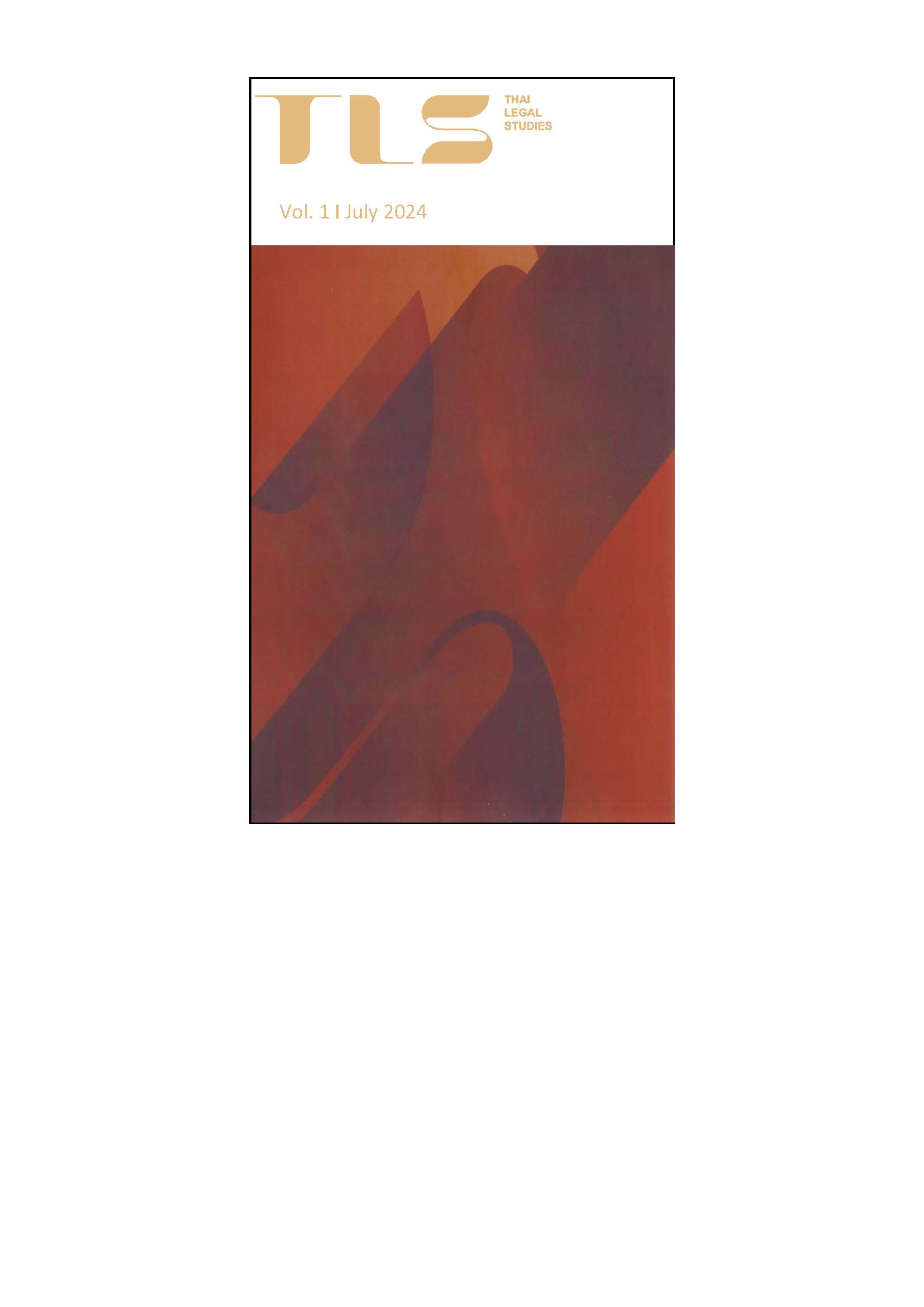Redefining Ownership Under Thai Law: Is It a Right or Title?
DOI:
https://doi.org/10.54157/tls.272793Keywords:
Gaian, Ownership, Things, Property, Merger interpretation, Titularity interpretationAbstract
In current Thai law, ownership is traditionally regarded as a real right applicable only to corporeal objects. An analysis of Supreme Court precedents suggests that certain intangible properties, like shares, are subject to usucapion (adverse possession), while some rights, such as copyrights and trademarks, are not. This leads to the question of which intangible objects may qualify as objects of ownership and could be acquired through usucapion. Furthermore, the paper conducts a comparative survey of ownership concepts in German and French legal systems alongside insights from Roman law articulated by the Gaius Institute. From all the connections, the author argues that ownership should be regarded not as a right but as a title and that its object can be extended to incorporeal objects that satisfy certain conditions, and this will have important implications for explaining why some types of incorporeal property, such as shares, may be acquired through usucapion but that others, such as intellectual property rights, cannot.
References
Aynès, Laurent. “Property Law.” In George A. Bermann and Etienne Picard (eds), Introduction to French Law (Kluwer Law International 2012).
Birks, Peter. “The Roman Concept of Dominium and the Idea of Absolute Ownership.” (1985) 1 Acta Juridica 2.
“Electricity Explained: The Science of Electricity.” (US Energy Information Administration, 19 December 2022). https://www.eia.gov/energyexplained/electricity/the-science-of-electricity.php
“Electromagnetic Waves.” (National Oceanic and Atmospheric Administration, 10 April 2023). https://www.noaa.gov/jetstream/satellites/electromagnetic-waves#:~:text=Electromagnetic%20waves%20are%20a%20form,when%20an%20electric%20field%20(Fig
Giglio, Francesco. “Pandectism and the Gaian Classification of Things.” (2012) 62 The University of Toronto Law Journal 13. https://doi.org/10.1353/tlj.2012.0003
Ginossar, Samuel. Droit réel, propriété et créance (Paris: Pichón et Durand-Auzias 1960).
Gretton, George. “Ownership and Its Objects.” (2007) 4 Rabels Zeitschrift für ausländisches und internationales Privatrecht 821. https://doi.org/10.1628/003372507782419462
Kaser, Max. Das römische Privatrecht (Munich: C. H. Beck 1971).
Nicholas, Barry. An Introduction to Roman Law (1st edn, Clarendon Press 1975).
Schulz, Fritz. Classical Roman Law (Darmstadt: Scientia Verlag 1992).
Sources in Thai
นิลุบล เลิศนุวัฒน์. กฎหมายจำนองและจำนำ (พิมพ์ครั้งที่ 1, โครงการตำราและเอกสารประกอบการสอนคณะนิติศาสตร์มหาวิทยาลัยธรรมศาสตร์ 2565) [Nilubol Lertnuwat. The Law of Mortgage and Pledge (1st edn, Bangkok: Faculty of Law Thammasat University 2022)].
———. กฎหมายบริษัทมหาชนจำกัด (พิมพ์ครั้งที่ 1, โครงการตำราและเอกสารประกอบการสอนคณะนิติศาสตร์มหาวิทยาลัยธรรมศาสตร์ 2566) [Public Limited Company Law (1st edn, Bangkok: Faculty of Law Thammasat University 2023)].
บัญญัติ สุชีวะ. คำอธิบายกฎหมายลักษณะทรัพย์ (พิมพ์ครั้งที่ 20, วิญญูชน 2565) [Banyat Sucheewa. Explanation of the Law of Things (20th edn, Winyuchon 2022)].
ประชุม โฉมฉาย. วิวัฒนาการของกฎหมายโรมัน (พิมพ์ครั้งที่ 3, โครงการตำราและเอกสารประกอบการสอนคณะนิติศาสตร์มหาวิทยาลัยธรรมศาสตร์ 2559) [Prachoom Chomchai. Evolution of Roman Law (3rd edn,Faculty of Law Thammasat University 2016)].
ประมูล สุวรรณศร. คำอธิบายประมวลกฎหมายแพ่งและพาณิชย์: ทรัพย์ (พิมพ์ครั้งที่ 1, นิติบรรณการ 2550) [Pramool Suwannasorn. Explanation of the Civil and Commercial Code: Things (1st edn, Nitibannagarn 2007)].
ศนันท์กรณ์ โสตถิพันธุ์. คำอธิบายความรู้เบื้องต้นเกี่ยวกับกฎหมายเอกชนโรมัน (พิมพ์ครั้งที่ 1, วิญญูชน 2559) [Sanunkorn Sotthibandhu. An Introduction to Roman Private Law (1st edn, Winyuchon 2016)].
———. คำอธิบายหลักพื้นฐานของกฎหมายเอกชน (พิมพ์ครั้งที่ 1, วิญญูชน 2562) [Basic Principle of Private Law (1st edn, Winyuchon 2019)].
———. คำอธิบายกฎหมายลักษณะทรัพย์สิน (พิมพ์ครั้งที่ 1, วิญญูชน 2566) [Explanation of the Law of Property (1st edn, Winyuchon 2023)].
ศรีราชา วงศารยางกูร. คำอธิบายกฎหมายว่าด้วยทรัพย์สิน (พิมพ์ครั้งที่ 8, วิญญูชน 2564) [Sriracha Wongsarayangkul. Explanation of the Property Law (8th edn, Winyuchon 2021)].
สมเกียรติ วรปัญญาอนันต์. “ข้อความคิดว่าด้วยการครอบครองตามกฎหมายลักษณะทรัพย์สิน” (2564) 50(1) วารสารนิติศาสตร์ มหาวิทยาลัยธรรมศาสตร์ [Somkiat Worapunyaanun. “The Concept of Possession in Property Law” (2021) 50(1) Thammasat Law Journal].
สหธน รัตนไพจิตร. คำอธิบายกฎหมายลักษณะห้างหุ้นส่วนบริษัท (พิมพ์ครั้งที่ 7, วิญญูชน 2564) [Sahaton Rattanapijit. Explanation of the Law of Partnership and Company (7th edn, Winyuchon 2021)].
อานนท์ มาเม้า. กรรมสิทธิ์ (พิมพ์ครั้งที่ 1, โครงการตำราและเอกสารประกอบการสอนคณะนิติศาสตร์ มหาวิทยาลัยธรรมศาสตร์ 2560) [Arnon Mamout. Ownership (1st edn, Bangkok: Faculty of Law Thammasat University 2017)].
เสนีย์ ปราโมช. อธิบายประมวลกฎหมายแพ่งและพาณิชย์: กฎหมายลักษณะทรัพย์ (พิมพ์ครั้งที่ 1, กรุงเทพฯ: เนติบัณฑิตยสภา 2551) [Seni Pramoj. Explanation of the Civil and Commercial Code: The Law of Things (1st edn, Bangkok: Thai Bar Association 2008)].
โสภณ รัตนากร. คำอธิบายประมวลกฎหมายแพ่งและพาณิชย์ว่าด้วยหุ้นส่วนและบริษัท (พิมพ์ครั้งที่ 13, นิติบรรณการ 2556) [Sophon Rattanakorn. Explanation of the Civil and Commercial Code on Partnership and Company (13th edn, Nitibannagarn 2013)].
———. กฎหมายทรัพย์สิน: ความรู้พื้นฐานทางความคิด หลักทั่วไป และบทเบ็ดเสร็จทั่วไป (พิมพ์ครั้งที่ 4, วิญญูชน 2564) [Property Law: Knowledge Basic of General Idea (4th edn, Winyuchon 2021)].
Published
Issue
Section
License
Copyright (c) 2024 Norravich Limpanukorn

This work is licensed under a Creative Commons Attribution 4.0 International License.
Authors retain copyright and publishing rights without restrictions, but grant Thai Legal Studies the right of first publication in English and to distribute the work under a Creative Commons Attribution 4.0 International Public License (“CC BY 4.0”). It allows others to freely share the work, including the making of translations. There is no charge or fee for readers to immediately view published articles or content, and users are allowed to read, download, copy, distribute, print, search, link to the full texts of the articles, or use them for any other lawful purpose, without asking prior permission from Thai Legal Studies or the author(s), the only requirement being that an acknowledgement is given of the work’s authorship and its initial publication in English by Thai Legal Studies.







